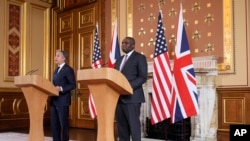The preliminary COP28 document proposes the elimination of fossil fuels.
 DUBAI —
DUBAI —
According to a draft of the negotiating document seen on Tuesday, countries participating in the COP28 climate conference are discussing the possibility of formally phasing out the use of fossil fuels as part of the final agreement at the U.N. summit to address global warming.
The suggestion is expected to generate strong discussion among the approximately 200 nations present at the two-week summit in Dubai. Some Western countries and those most susceptible to climate change are advocating for the inclusion of this language, while many oil and gas producing nations are in favor of omitting it.
On Tuesday, a study revealed that the world’s carbon dioxide emissions from burning fossil fuels are expected to reach a new peak this year. This has raised worries among researchers that current actions to address climate change may not be sufficient to prevent its severe consequences.
The U.N. climate body has released a draft of a potential final agreement for COP28, which suggests a planned and fair transition away from fossil fuels. This agreement, if accepted, would be the first worldwide deal to put an end to the use of oil.
At the COP28 primary platform, the chief executive officers of numerous prominent energy companies made a case for the use of oil and gas, emphasizing their advancements in reducing methane, a greenhouse gas.
“We are big guys and we can do big things. We can deliver results and we will have to report them very soon,” said Jean Paul Prates, CEO of Brazil’s state-run oil company Petrobras. “The energy transition will only be valid if it’s a fair transition,” he added.
According to an analysis of U.N. registration data by Kick Big Polluters Out, a minimum of 2,400 lobbyists for fossil fuel companies have registered for the current summit. This number surpasses the combined number of delegates from the 10 countries most at risk for climate change.
Environmental advocates held a series of minor demonstrations to oppose the influence of the fossil fuel sector.
Meanwhile, the Marshall Islands revealed a countrywide strategy to adjust to the increasing sea levels, acknowledging that the effects of climate change are already impacting its coast.
Kathy Jetnil-Kijiner, the climate envoy for the country, stated that while we aspire for a world where the Paris Agreement effectively addresses climate change, we must also acknowledge the challenging road ahead as a highly susceptible nation.
Negotiating text
The preliminary language for a final agreement at COP28 presents three potential approaches to addressing fossil fuels.
The initial step is a “systematic and fair discontinuation”. In United Nations terminology, the term “fair” implies that affluent countries with a lengthy track record of utilizing fossil fuels would have the quickest discontinuation.
The second request is to increase efforts in eliminating fossil fuels without restrictions. The third suggestion is to refrain from mentioning a phase-out entirely.
The United States, the 27 countries within the European Union, and small island states that are susceptible to climate change are advocating for the elimination of fossil fuels in order to achieve significant reductions in CO2 emissions, as recommended by scientists within the next ten years.
However, according to the Net Zero Tracker, which is an independent data consortium that includes Oxford University, none of the world’s leading oil and gas-producing nations have intentions to cease drilling for these resources in the future.
“The discussion is not about shutting off the faucet overnight,” stated German Climate Envoy Jennifer Morgan. “What we are witnessing is a significant conflict over the type of energy system we will collectively construct for the future.”
Prominent producers such as Saudi Arabia and Russia have previously rejected suggestions to gradually eliminate.
According to David Waskow, the leader of the World Resources Institute’s initiative on climate change, it is unlikely that COP28 will produce any significant results without a specific directive to shift away from the use of oil, gas, and coal on a global scale.
He stated that it is unlikely for us to depart from Dubai without receiving specific instructions and clarity on transitioning away from nonrenewable energy sources.
The preliminary document additionally contains phrasing advocating for the expansion of carbon capture technology, which may face resistance from certain nations concerned that these emerging technologies are being used to justify the ongoing reliance on fossil fuels.
Emissions from fossil fuels are increasing.
During the COP28 summit, John Kerry, the U.S. special envoy for climate, unveiled a global initiative involving 35 nations to enhance nuclear fusion, an emerging technology aimed at utilizing the powerful process that fuels the sun.
Kerry stated that fusion has the potential to completely transform our world.
Fusion is one of many bold and occasionally improbable concepts designed to assist in accelerating decarbonization.
According to the Global Carbon Budget report, scientists from over 90 institutions predict that countries will release a combined 36.8 billion metric tons of CO2 from fossil fuels in 2023, which is a 1.1% rise from the previous year’s record.
According to the report, the emissions performance is causing the world to move even farther from the goal of limiting global warming to 1.5 degrees Celsius above pre-industrial levels.
To receive daily, thorough updates on COP28 in your email, subscribe to the Reuters Sustainable Switch newsletter by clicking this link.
Source: voanews.com




